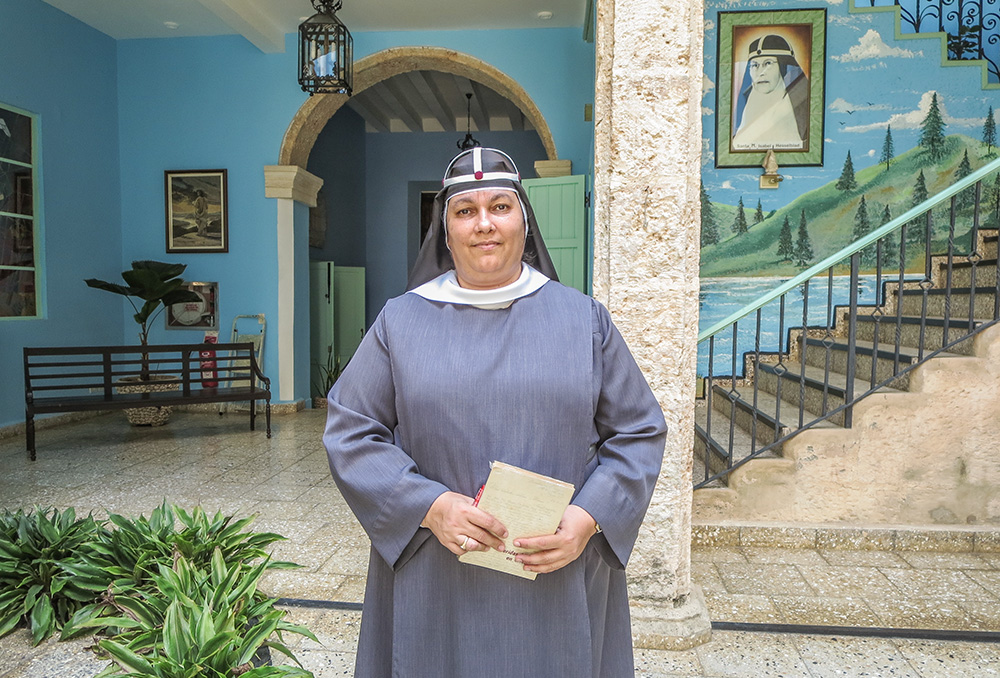
Sr. María Ángel Díaz Ledesma in the hallway of Casa Santa Brigida in Havana. Behind her is a portrait of the founder of the Order of the Most Holy Savior of St. Bridget, St. Mary Elizabeth Hesselblad. (Joanna Kozakiewicz)
Sr. María Ángel Díaz Ledesma is a member of the Order of the Most Holy Savior of St. Bridget (Orden del Santísimo Salvador de Santa Brígida) in Cuba. The order was founded by St. Brigida de Svezia in 1369 and re-founded by St. Mary Elizabeth Hesselblad in 1911.
In Old Havana, near San Francisco de Assisi Square, Díaz Ledesma contributes to running a hostel for tourists called Casa Santa Brigida. As the sisters support themselves autonomously, they depend on the tourists to fund their apostolate of caring for the poor and sick. The order's ecumenical, spiritual and missionary works go hand in hand with the daily adoration of the Blessed Sacrament and the ministry of hospitality.
The situation in Cuba is difficult due to food and medication shortages, even for those with better incomes. Cuba has problems with cash, supply chains and distribution chains, which forces Cubans to make purchases on the black market. Since the COVID-19 pandemic, Cuba has been particularly hit as international trade suffered, wages dropped and public services deteriorated.
The sisters welcome food donations from locals to redistribute it in the periphery for those in need. When tourists stay in their hostel, the sisters are grateful as they know they can help more needy people.
Advertisement
The streets of Havana, filled with beautiful antique cars, are harshly contrasted with poverty. Since the 1990s, Cubans have been unable to afford necessities, and speaking with the international press is discouraged. Between 2022 and 2023, more than 1 million people left the island.
Díaz Ledesma agreed to speak with Global Sisters Report.
GSR: Can you introduce yourself and your ministry?
Díaz Ledesma: My name is Sister María Ángel, and I am a religious sister of the Order of the Most Holy Savior of St. Bridget. I have been a religious for 16 years, serving in this congregation. The charism of ecumenism, the unity of Christians, is our apostolate. It's the basis of our work.
Our apostolate is centered on taking care of the sick and preparing food for the people who are poor and hungry in Havana. Additionally, we also teach catechism classes to children.
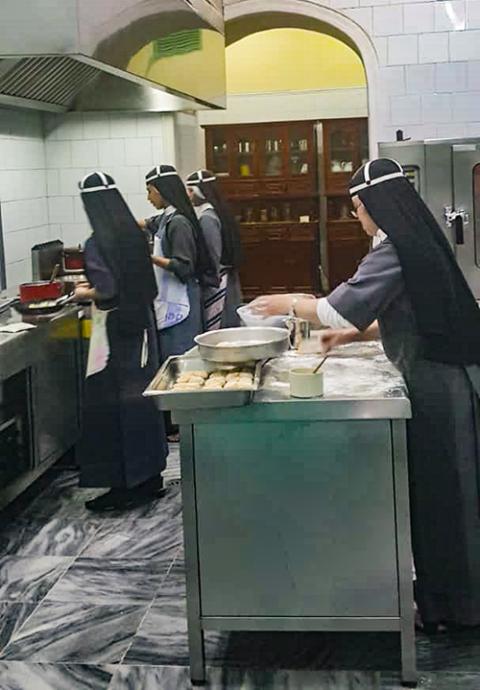
Brigidine sisters in their kitchen at Casa Santa Brigida in Havana prepare food to offer to those in need. (Courtesy of María Ángel Díaz Ledesma)
GSR: Do you actively distribute food in the street or offer food at the convent?
Díaz Ledesma: Usually, on Thursdays in the afternoon, a different duo of sisters goes out into the streets of Havana and visits those who are sick, old, alone and abandoned. First, we offer them our presence and our prayers. Then we see what their individual needs are [in terms of food or medication]. It is a way for us to be in touch with reality and touch God in the skin of those vulnerable people.
After COVID-19, the situation has become more difficult to obtain food. But, with our work and our sacrifices, whatever we can gather, we offer back to a group of poor people who live in the streets.
GSR: Do you visit specific people?
Díaz Ledesma: Yes, the people we visit are specific because we follow up with them and their conditions. Our goal is to offer them a message of hope. When we offer them some food, we also try to offer spiritual support. We pray with them and offer them our presence.
If we don't bring the poor indoors to serve them food when they knock on our door, we will offer them what we have. We also check the periphery and locations where there is not much help, and if we have a donation, we go to a particular family to help them.
Our Thursdays are dedicated to our ministry. Therefore, in the morning, we prepare ourselves with Mass and our program for the day. In the afternoon, we visit the houses of our local people. We look for medicine, food and clothing that they might need, especially for those abandoned and discarded by society.
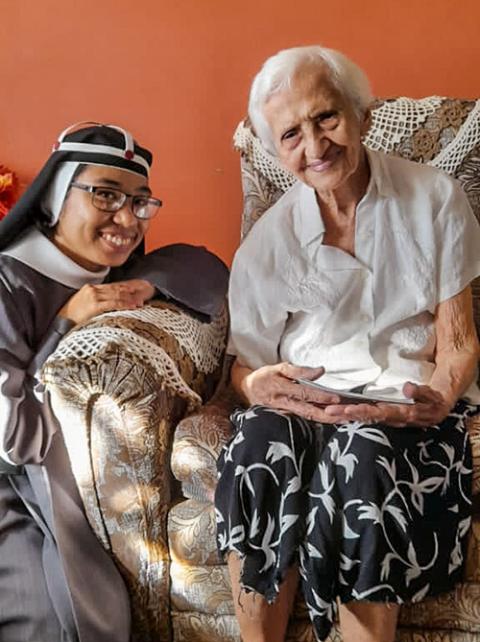
One of the Brigidine sisters in Havana visits an elder who lives alone. (Courtesy of María Ángel Díaz Ledesma)
Sometimes, we don't have the medicine right away, so we ask around to see if we can meet their needs.
GSR: What are the most important needs in Havana?
Díaz Ledesma: Food, medicine and surgical materials are the biggest needs. In second place are clothing and shoes.
GSR: How do you distribute food if the supply is limited in Cuba?
Díaz Ledesma: When a Cuban person comes and donates their portion, we can use it to help others. Plus, with our work in the hotel, whatever money we have, we use it to help others.
We are autonomous, [and] we don't depend on anyone, so when tourists come here and leave money, we can use it to support the community.
GSR: Do you mean that you use the money from the hotel to help?
Díaz Ledesma: Our hotel service is part of our apostolate. The income we receive from the hotel is used to keep up the entire building, do renovations, use electricity, keep up the rooms, and the rest is for our apostolate.
GSR: Which area(s) do you serve?
Díaz Ledesma: Our life is semicloistered, so we take care of the area closest to our convent, and through some known priests and people who collaborate with the community, we send aid to the peripheral areas of Havana and other parts of the country.
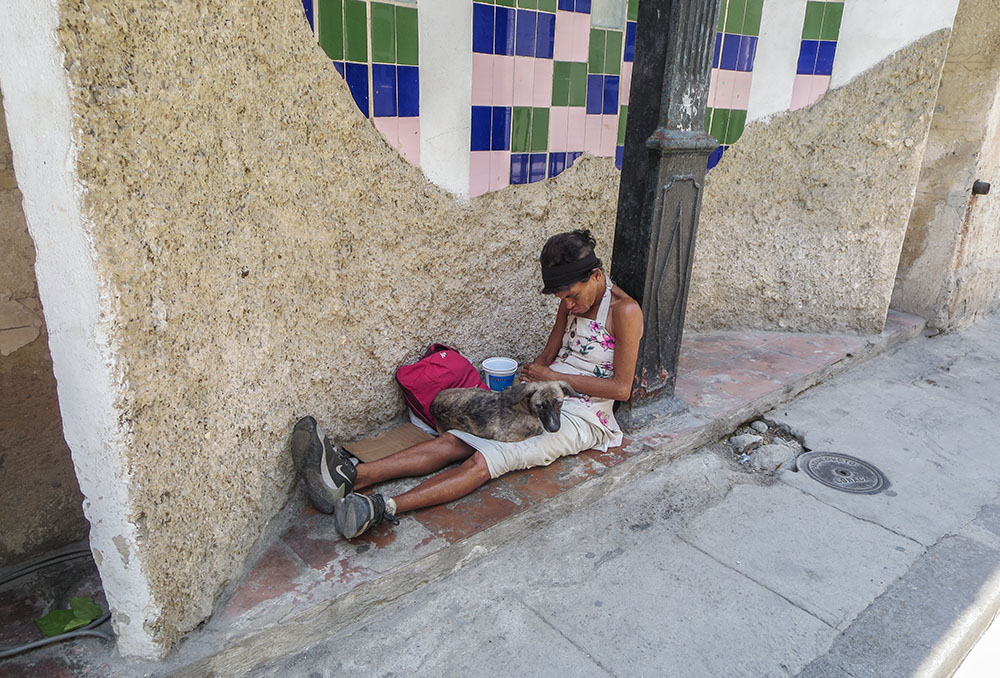
A local homeless person sits just a few meters from Casa Santa Brigida in Havana. (Joanna Kozakiewicz)
On days that are not Thursdays, we go further than our peripheries, such as the hospital or another city. We bring clothes and shoes to areas farther from Havana where they don't receive much help.
GSR: How many people do you help?
Díaz Ledesma: Often, we do not have the medicines that people ask for. However, every day, many people knock on our doors looking for resources, and we have a group of about 10 poor families that we help each week to meet their urgent needs.
I would like to clarify that our apostolate is to serve the church with our prayers and sacrifices for the restoration of the unity of Christians. We do not live outside the needs of the people, and we get involved in these activities as a source and a bridge in the needs that we can cover for the affected families.
GSR: When did this ministry start?
Díaz Ledesma: We have been present in Cuba since March 8, 2003. When we started, we had more possibilities, the economy was better and we could help more easily. In 2019, we had a group of 30-40 people who came here to eat weekly.
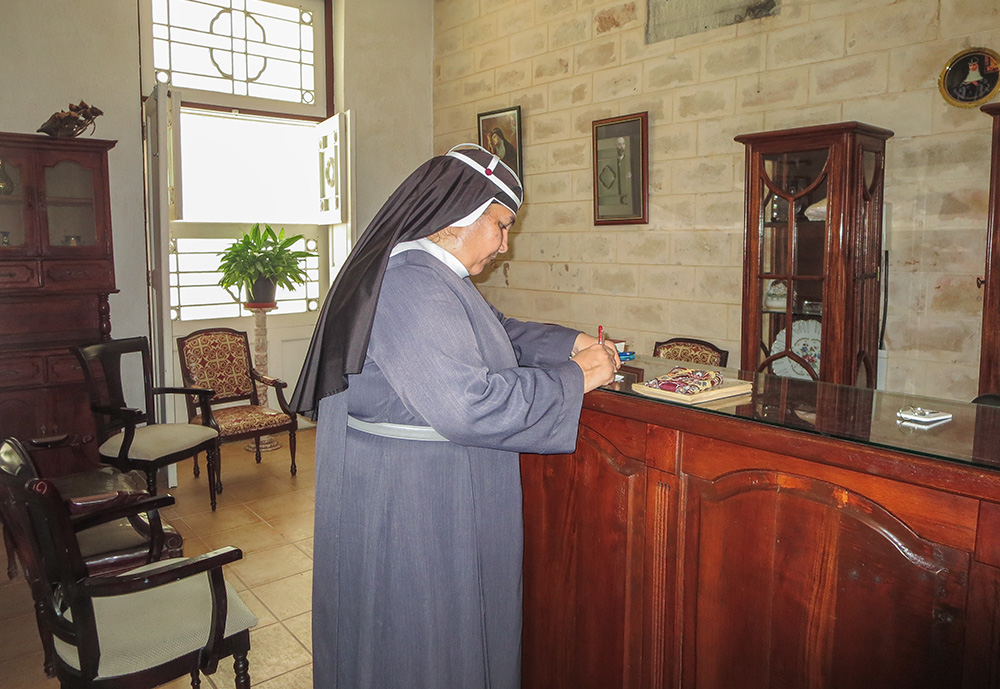
Sr. María Ángel Díaz Ledesma in the reception area of Casa Santa Brigida where the guests arrive (Joanna Kozakiewicz)
GSR: What kind of activities are your guests invited to participate in when they stay at Casa Santa Brigida? And why should tourists stay at Casa Santa Brigida?
Díaz Ledesma: The guests who visit our convent come for a short stay but are invited to participate in the celebration of the daily Mass, and when there is lunch service for the "grandparents," they are invited to dialogue with them.
We work responsibly for the safety and security of our guests. We provide them with accommodation that is hygienic, organized and hospitable. Finally, we offer them a good atmosphere and silence.
GSR: How do your efforts differ from those of other congregations in the area?
Díaz Ledesma: There are more than 80 congregations all over the country. The difference between us and other congregations is that other congregations are active from morning to afternoon, while we are semicloistered.
More privately, people know us, and our outreach is based on the feedback we get from our neighbors to orient us.
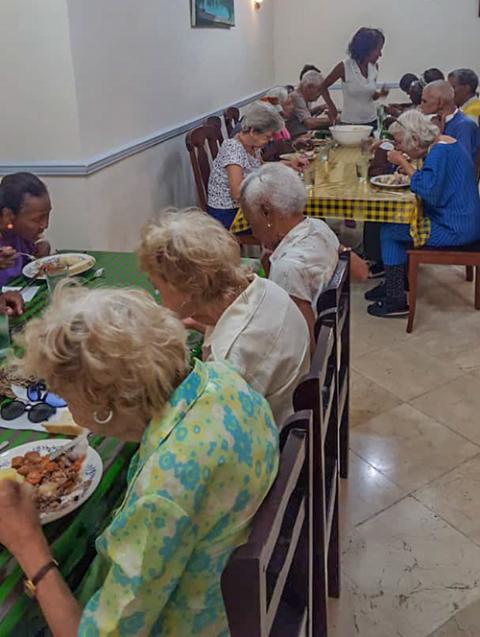
Before COVID-19, the sisters were able to serve food to many seniors. (Courtesy of María Ángel Díaz Ledesma)
Sometimes, people simply knock on our door and let us know that a person is at the hospital or is poor and needs help. Then, we visit and take care of that person or family.
Sometimes, these people are surprised to get help they were not expecting. I think it's very fruitful for them to receive us. It's a blessing for people who have no more hope in a difficult moment in their lives. We often hear from people that they are very grateful that in a moment of despair, someone came to help them.
GSR: What other causes are you involved in?
Díaz Ledesma: We have children to catechize as well. Some children in the streets have problems with their families, so we open our doors to them, catechize and educate them about how to behave properly. We [also] prepare them sandwiches.
GSR: Can you conclude with a touching story that speaks of hope?
Díaz Ledesma: One day, I went to visit a family in need, and when I arrived, there was no one at home. I did not want to return to the convent without helping someone, and as I was walking down another street, I met a lady who was 87 years old and blind. She had gone out to look for food, but she did not find what she was looking for and did not have enough money to buy what she needed.
As we walked together to bring her closer to her home, I asked her if she would accept the little help I wanted to offer her. She accepted, and when she realized that the bag contained exactly what she was looking for, she exclaimed, "God sends his angels to the streets, and today I found one. Hope does not disappoint. I had faith that I would have a glass of milk before the end of the day."
This was a profound teaching moment for me to hear her tell me that God sends his angels to the streets. My mission that day was different, and yet I was the hope of someone else in need.





